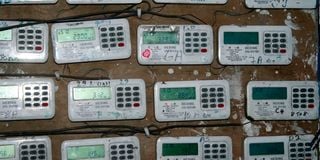Lawmakers, IPPs differ on lowering of electricity cost

Prepaid electricity token metres installed at an apartment block in the Kasarani neighbourhood of Nairobi in mid-January 2020.
Members of Parliament yesterday clashed with Independent Power Producers (IPPs) on strategies to reduce high electricity prices.
While the lawmakers called for, among other proposals, re-negotiation of the Power Purchase Agreements (PPAs), payment of IPPs in Kenyan shillings as opposed to US dollars and change of power sales, IPPs said power costs should be looked at holistically rather than targeting the firms unfairly.
The IPPs told the National Assembly Committee on Energy that, if the government wants the PPAs to be re-negotiated and payment made in local currencies, it should buy the loans they took with international banks.
They also told MPs the overall power costs passed on to consumers is caused by several hidden charges, including wastage, leakages and management issues in some organisations beyond the control of the IPPs.
Kopere Solar Park Limited Chairman James Kimonye told MPs to be cautious on how they handle the matter, saying, it risks driving away investors.
“Whatever you do, just ensure investors stay in the country because some of them are very sceptical of investing in the energy sector,” Mr Kimonye said.
Regen Teremi Limited Finance Director Sam Kangau dismissed the notion that IPPs are paid a lot of money yet they sell power at exorbitant prices to consumers.
According to Mr Kangau, 85 per cent of the payment they receive from Kenya Power goes towards payment of loans used to set up power plants. They also pay the Water Resources Authority (WRA).
He added that, at the time the IPPs signed the PPAs, they used to pay WRA five cents (0.2 per cent) but this figure has since increased to Sh2 shillings (20 per cent). He explained that, while IPPs are charged six per cent interest in loan repayments to international banks, local commercial banks charge up to 15 per cent, hence it’s not easy for the firms to change the contracts and be paid in local currencies as demanded by MPs.
Frontier Energy’s Kwame Parker said IPPs, unlike KenGen, do not benefit from any financial support and subsidies from the government.
MPs pledges to ensure that future PPAs are approved by Parliament before implementation. Committee chairman Vincent Musyoka also insisted that there would be no negotiation on the model of power contracts IPPs are going to sign.
Mr Musyoka said Parliament would ensure that the government is no longer forced to pay IPPs for unused power.
Take-or-pay is a policy where taxpayers pay IPPs for power produced even if it has not been consumed. MPs want this changed so that Kenya Power only pays for power used rather than power produced.
“This is the next big conversation that we must have so that investors can make money and consumers also benefit from low power bills,” Mr Musyoka said.
Ruiru MP Simon King’ara said the take-or pay-model is unfair to the country and consumers. The MPs said the IPPs must agree to renegotiate the PPAs and also be paid in local currencies.





